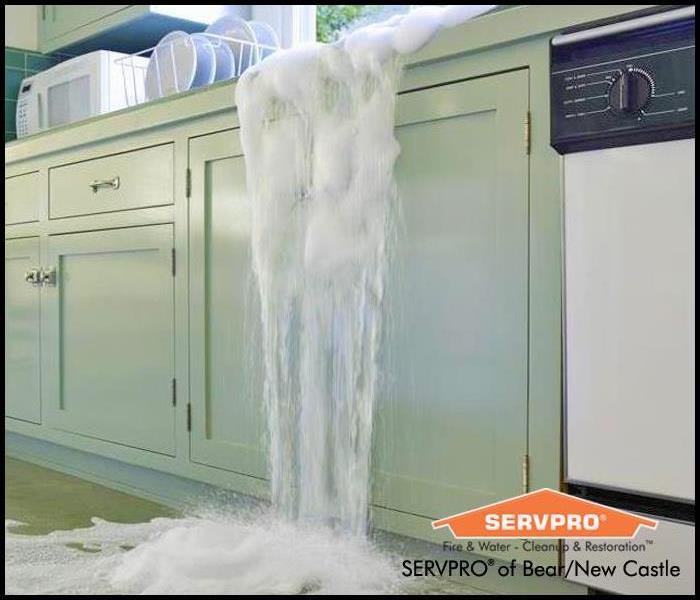Newark DE Homes: How to Minimize Your Chance of Water Damage
3/15/2022 (Permalink)
 Sometimes water damage in your home is out of your control, which is why SERVPRO of Bear/New Castle is a call away at 302-392-6000.
Sometimes water damage in your home is out of your control, which is why SERVPRO of Bear/New Castle is a call away at 302-392-6000.
As a homeowner, you can do everything right by taking preventative measures against water damage but things can still go wrong. Appliances with waterlines can have concealed leaks that won’t be noticeable until the damage is done. Pipes can break, toilets can overflow, and water can seep behind your walls and under your floors. Water damage can also occur after a violent storm, a flood, or several days of steady rain and leave you with damage to valuable belongings, your flooring, and structural components. Also be aware if you have a basement or a lower level as they are especially prone to this type of damage.
The Reality of Water Damage Statistics
It's easy to think that water damage or storm damage won't happen to you but statistics say otherwise: 14,000 people in the US experience a water damage emergency at home or work each day, and 98% of basements in the US will suffer from some type of water damage during their lifetime. Water damage is also among the most common causes of property insurance claims. While you cannot stop a storm from happening, you can take these following steps to prevent water damage overall.
Kitchens and Bathrooms
Kitchens and bathrooms are susceptible to water damage simply due to the amount of plumbing in these areas. Be sure to fix any leaking or dripping pipes promptly, and be aware of elevated humidity levels that could indicate an underlying plumbing problem. Maintain caulk around showers and bathtubs since water that passes through gaps can penetrate walls and subfloors. If this sealant has cracked or separated, have it repaired. The good news is that you can probably complete that task yourself, but it doesn’t hurt to involve a professional.
Appliances
As previously mentioned, it’s difficult to tell if your appliances are leaking, but there are things you can do to reduce the risk. To start, inspect the waterlines for your appliances at least once per year. If you notice that any hoses are brittle, cracked, or crimped, replace them before they fail. Pay special attention to hoses for washing machines, refrigerators, and ice makers; since washing machines have inlet hoses and drains, they are especially prone to leaks. Also turn off the water supply for all appliances before traveling out of town so there’s no watery surprises when you return home.
Protecting Pipes
Colder weather can cause pipes to freeze and burst. Protect your plumbing from this by insulating pipes that travel along exterior walls or through unheated crawlspaces. On cold nights, open cupboard doors to allow heat that would otherwise be closed off to that area for pipes behind the wall and let your faucets maintain a slow drip to keep the water flowing (double check that the drain isn’t blocked before doing so). Never set the thermostat below 55 degrees in your home either. Before winter, drain all watering hoses, and turn off valves for exterior faucets. If a pipe does freeze, don't thaw it too quickly otherwise you will have a pipe burst on your hands.
If a Water Emergency Does Occur
- Turn off the water supply immediately, call your utility company if necessary.
- Use mops and towels to remove as much water as possible; shop vacs work great too.
- Turn on fans, dehumidifiers, or air conditioners to remove excess moisture.
- Use wood blocks or tinfoil to elevate or separate furniture from wet surfaces.
- Remove area rugs, table lamps, and colored items to prevent staining and to help dry the underlying surface.
- Place wet sofa cushions and upholstered items on end for faster drying.
- Never use ceiling lights, TVs, or appliances in waterlogged areas.
- Remove books, magazines, and items that may bleed or stain.
- Stay out of areas where ceilings are sagging.
By taking preventive measures, you can minimize the likelihood of water damage affecting your home. If you do experience water damage at your home or business, respond quickly and call the professionals at SERVPRO of Bear/New Castle at (302) 392-6000.
Why Choose SERVPRO of Bear/New Castle?
For over 20 years, SERVPRO of Bear/New Castle has specialized in water damage repair and restoration. Our highly trained professionals use state-of-the-art equipment and document every step of the drying process, ensuring the job is done correctly from the initial phone call to the final bill.






 24/7 Emergency Service
24/7 Emergency Service